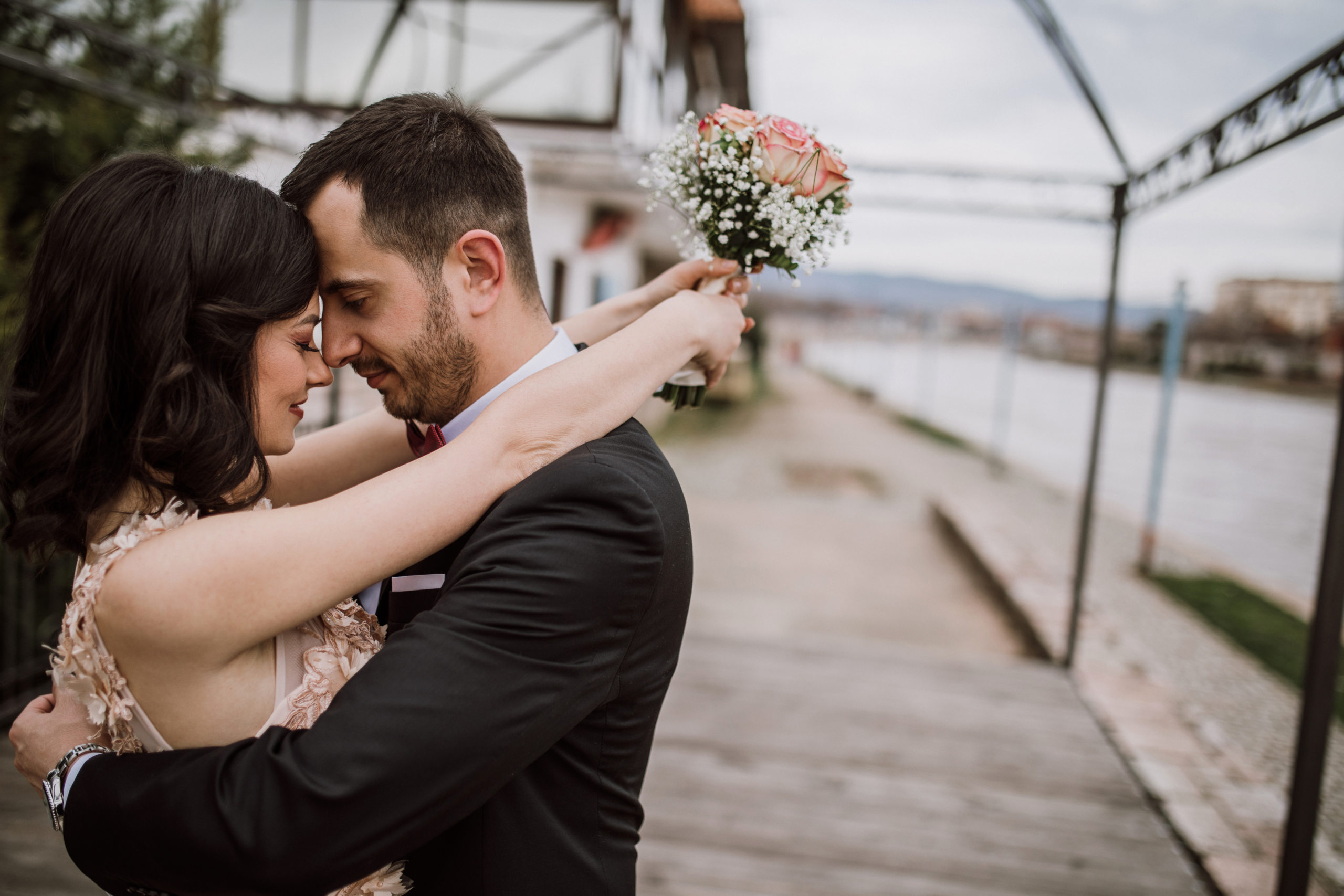Anyone who has planned a wedding knows that endless hours and a good chunk of change can go into it. So, leading up to the big day, one of the last things you want is for something unexpected to derail your wedding — leaving you stuck with the bill.
“Most couples would rather not imagine something going wrong at their own weddings, but the reality is anything can happen,” says David Berke, founder of eWed Insurance, a wedding insurance company based in New York.
Many engaged couples were forced to postpone or cancel their weddings after the COVID-19 outbreak hit the United States in early 2020. While few could have anticipated that a pandemic would strike as they were planning the big day, there are ways to protect yourself against the unexpected.
“It’s better to be prepared than to be blindsided by something that can very easily ruin everything you’ve planned for with such care,” Berke says.
So, how can you prepare? For many couples, wedding insurance provides that peace of mind. Here’s what you need to know:
- What Is Wedding Insurance?
- What Does Wedding Day Insurance Cover?
- What’s Not Covered By Wedding Event Insurance?
- How Does Wedding Insurance Work?
- How Much Wedding Insurance Costs
- Why Should You Get Wedding Insurance?
- Do You Need Wedding Insurance?
- When Should You Get Wedding Insurance?
- Choosing the Right Wedding Insurance Policy
- The Bottom Line
What Is Wedding Insurance?
Wedding insurance, also known as special event insurance, covers couples against losses due to circumstances outside of their control. Depending on the type of coverage you purchase, you can protect yourself financially from a wide range of circumstances, such as problems with vendors, illness or injury, extreme weather, military deployment, lost or stolen gifts, and damage to wedding attire.
What Does Wedding Day Insurance Cover?
Here’s how wedding insurance protected one couple leading up to their big day. In 2010, a client of Dulles Designs, which prints custom stationery and invitations, was planning a formal wedding at the Kiawah Island Golf Resort near Charleston, South Carolina, when the unexpected struck.
“We had designed and letterpress-printed her beautiful wedding invitations and were ready to hand-cancel and mail her calligraphy-addressed envelopes out to all invitees,” says Emilie Dulles, owner of Dulles Designs, which is also based in Charleston. But right as the team was stamping the envelopes, it learned via local news that the client’s reception venue was on fire.
“Sadly, the River Course Clubhouse was so severely damaged in the fire that it was clear no wedding would be taking place there anytime soon,” Dulles says.
The good news was that the bride had wedding insurance. Not only was she able to switch venues, but her initial investment in custom stationery was also safeguarded. Dulles Designs printed a new reception insert card explaining the change in venue and mailed everything to her guests as quickly as possible.
In the case of Dulles’ client, wedding insurance helped save the day. However, what’s actually covered by insurance depends on the policy you purchase. There are two main types of wedding insurance for you to consider.
Wedding liability insurance
Liability insurance is typically required by your venue, according to Berke. It protects both you and the venue in the event of certain mishaps, including:
- Damage to the venue caused by your party
- Injuries sustained at the wedding
Liability insurance will likely pay for the repair costs and resulting medical bills. Keep in mind that liability insurance usually covers a 24- to 48-hour period that ends once the reception breakdown is over. So, while you may be able to insure the rehearsal dinner, your post-wedding celebrations probably won’t be covered.
These insurance policies often include host liquor liability insurance, which is necessary if you’re catering the wedding yourself or if the venue or catering company doesn’t have it. Host liquor liability insurance protects you in case alcohol consumption at your wedding leads to any charges.
Wedding cancellation insurance
Cancellation insurance protects you from unforeseen events that might force you to postpone the wedding and lose your deposits. These events can include:
- Extreme weather that prevents widespread attendance
- Serious illness that strikes you, your partner, or your immediate families
- Dealing with vendors who don’t show up or have gone out of business
- Replacing your wedding dress
- Military deployment
The exact details of your coverage will depend on the insurer that you choose, so make sure to pay close attention to what’s included when you’re reviewing different policies.
Additional insurance options
If you’re having a smaller wedding, it may be worth exploring these insurance options:
- Homeowners insurance policies that provide special event coverage (this may apply only if the wedding is held at your home)
- Travel insurance coverage for destination weddings
- Special event insurance that broadly covers small, short-term, low-hazard events
What’s Not Covered By Wedding Event Insurance?
Wedding insurance covers many things, but understand that you aren’t protected in every instance. These are some of the situations where you likely won’t be covered:
- Calling off the wedding due to a change of heart, according to Berke — if you get cold feet and decide to pull the plug on your big day, you’ll be fully responsible for the costs!
- Damaging or losing your engagement ring, which can be safeguarded using a separate engagement ring insurance policy
- Your wedding party and guests damaging or losing their jewelry and watches, according to The Knot
How Does Wedding Insurance Work?
Each insurer may process claims differently, but here’s what you can generally expect if you end up needing to use your wedding insurance:
- Something unfortunate happens. It could be a storm that knocks out the power grid, a severe illness within your immediate family, or accidental damage to the venue during your big day. Whatever the cause, you’re scrambling to move the wedding date or cover unexpected costs.
- You file a claim. Contact your insurance provider to find out exactly what you need to file a claim. The process can usually be completed online or by phone.
- Your claim is investigated. Before you see any money, your insurance provider will gather details about the incident and assess the loss. Based on that information and your policy’s terms, you’ll receive a settlement estimate.
- You get reimbursed. If you opted for cancellation insurance, you’ll typically be compensated for nonrefundable deposits or payments to the venue and vendors. If you purchased liability insurance, you’ll have medical and repair bills covered if someone was injured or damage was done to the venue. Keep in mind that your policies may have limits on the total reimbursement amount.
How Much Wedding Insurance Costs
What you’ll pay for wedding insurance is influenced by several factors, including the number of guests in attendance. General liability insurance providing up to $1 million in coverage will cost about $185, according to The Knot. A basic policy covering losses such as photos and videos, gifts, special attire, rings, and various deposits typically runs from $155 to $550.
However, the final cost of your wedding insurance policy could end up being much lower or higher, depending on your situation and the amount of coverage you buy. Of course, adding cancellation coverage will bring the cost up.
Why Should You Get Wedding Insurance?
Your wedding day might go perfectly — or there could be trouble that gets expensive quickly. Recent events have reminded us all that anything can happen to derail even the best-laid plans:
- Restrictions prompted by the coronavirus pandemic have shown that public health concerns can suddenly cancel or postpone a wedding.
- The COVID-19 outbreak has also emphasized that illness can strike without warning, with particular danger to elderly people who may be very important wedding guests.
- Extreme weather events can ground all travel and prevent guests from attending (or knock out the power at the venue).
Of course, we hope your wedding goes off without a hitch. However, if something unfortunate does happen, it’ll be easier to roll with the punches knowing that you don’t have to foot the entire bill.
Do You Need Wedding Insurance?
Dulles recommends wedding insurance to 100% of her clients. For one, many venues require couples to show proof of insurance in case of bodily injury or property damage. It’s also a relatively small price to pay for protection against the unknown.
“It should be factored into every wedding budget as a line item right up there with venue, invitations, flowers, food and beverage, etc.,” Dulles says.
There’s no way to know if you’ll end up needing your wedding insurance, but every gathering is vulnerable to unpredictable factors. If you can’t afford to cover the potential costs resulting from cancellation, damage, or injury, then it’s financially smart to purchase wedding insurance.
When Should You Get Wedding Insurance?
Insurance is generally purchased as soon as you start paying deposits to your venue and vendors, according to Berke.
“This is the time you start to be at risk for a loss,” he says.
Choosing the Right Wedding Insurance Policy
Deciding on the best wedding insurance policy for your situation might seem overwhelming, but don’t stress. There are a few steps you can follow to determine the coverage you need.
1. Start with the venue
The first thing you should do is go over your venue’s contract. Find out if the venue has its own liability coverage or if you’ll need to buy it.
“Liability insurance can be purchased closer to the event date, once you have final details and guest counts confirmed,” Dulles says.
Either way, wedding liability insurance isn’t something you want to skip, as a major injury or damage to the venue could leave you with a bill for thousands of dollars.
2. Decide on liability, cancellation, or both
Next, figure out what type of policy you’ll need based on the financial losses you want to protect against. We’ve established that wedding liability insurance is important to have, but you’ll want to carefully consider adding cancellation insurance. After all, shelling out for this type of insurance coverage might mean you’ll need to trim the budget for flowers or cut a couple of people from the guest list. Most couples purchase insurance in an amount roughly equal to their wedding budget, Berke says.
When deciding whether to get cancellation insurance, think of different factors that could affect your wedding. For example:
- Are snowstorms a possibility, or is it during hurricane season?
- Could you or your future spouse be deployed before tying the knot?
- What would you do if important family members became ill and couldn’t make the ceremony?
If you decide to purchase cancellation insurance, Dulles recommends doing so before making any big payments, such as purchasing the dress, booking the venue and band, or designing and printing the invitations. This helps ensure that each payment receipt or invoice date is well within the coverage period.
3. Find the right insurance company
Once you’ve decided on how much coverage to get, it’s time to pick an insurer. There are plenty of wedding insurance companies out there, so how do you choose the best one? Like with your policy, the right insurer for your situation will depend on several factors, like the size of your wedding, the venue location, and existing coverage limits.
“You should research wedding insurance with your existing insurance provider and also inquire from large nationwide companies that might have more competitive rates,” Dulles says.
Below are wedding insurance companies that were highly rated by Reviews.com as of August 2020. These four providers came out on top in terms of coverage options, features, and flexibility:
| Reviews.com Analysis | Markel Specialty | Travelers | Wedsure | WedSafe |
|---|---|---|---|---|
| Best For | Overall coverage | Destination weddings | Customizable policies | Liability coverage |
| Good To Know |
|
|
|
|
The Bottom Line
No matter your budget, your wedding day is usually a memorable one. Make sure you remember it for all the right reasons by protecting yourself against life’s unknowns. Whether you want to cover the bare minimum or protect every possible aspect of your wedding, there’s a policy out there that’s right for you.



